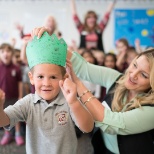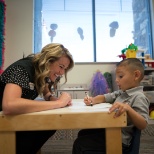Challenger School Foundation Australia

Challenger School Foundation Headquarters Location
Sandy, UT
About Challenger School Foundation
Challenger School is an independent, non-profit private school.
We operate 25 campuses in California, Idaho, Nevada, Utah, and Texas, with more than 10,000 preschool to eighth grade students enrolled annually.
Challenger emphasizes the bedrock of knowledge: reading, composition, math, and history. We promote individual and independent thinking, teach traditional American history and values, and inspire children to embrace challenge and find joy and self-worth through achievement.
Unlike charter or other public schools that are funded by taxes and thus bound by government mandates on education, we have the freedom to do what is right for our students. We are able to use proven, effective curriculum and methods to teach and challenge students.
We see impressive results in our students’ academic aptitude, their ability to manage themselves, and their standardized test scores. However, one of the most important outcomes is our students’ confidence in independently applying their knowledge and reasoning skills to evaluate ideas.
OUR MISSION
is to prepare children to become self-reliant, productive individuals;
to teach them to think, speak, and write with clarity, precision, and independence;
to lead them to recognize and value their individuality and unalienable rights;
and to inspire them to embrace challenge and find joy and self-worth through achievement.
www.ChallengerSchool.com
About UsWe operate 25 campuses in California, Idaho, Nevada, Utah, and Texas, with more than 10,000 preschool to eighth grade students enrolled annually.
Challenger emphasizes the bedrock of knowledge: reading, composition, math, and history. We promote individual and independent thinking, teach traditional American history and values, and inspire children to embrace challenge and find joy and self-worth through achievement.
Unlike charter or other public schools that are funded by taxes and thus bound by government mandates on education, we have the freedom to do what is right for our students. We are able to use proven, effective curriculum and methods to teach and challenge students.
We see impressive results in our students’ academic aptitude, their ability to manage themselves, and their standardized test scores. However, one of the most important outcomes is our students’ confidence in independently applying their knowledge and reasoning skills to evaluate ideas.
OUR MISSION
is to prepare children to become self-reliant, productive individuals;
to teach them to think, speak, and write with clarity, precision, and independence;
to lead them to recognize and value their individuality and unalienable rights;
and to inspire them to embrace challenge and find joy and self-worth through achievement.
www.ChallengerSchool.com
We focus our course of study on the subjects that form a foundation for all future education:
Reading is essential to all academic pursuits as it is the means of individual access to all subjects and to the sum of all human knowledge
Composition is necessary to clear, precise thinking in any subject because properly presenting ideas in writing requires and promotes intellectual inquiry and exactness
Math is the science of measurement, which makes the vast universe comprehensible and begins with arithmetic, which is like literacy in relation to numbers
History is the study of human action and its causes and effects; its study reveals principles applicable to all periods, including ours
Logic is the process of classifying abstractions without contradictions; we teach students that new ideas should integrate with, not contradict, the other ideas they have learned, and when they don’t, to find out why
Mastery of these disciplines strengthens a student in all other subjects.
We consider a study of science, speech, literature, geography, music, art, and physical education to be imperative to a well-rounded academic education. We also teach phonics, sentence diagramming, and penmanship—tried and true practices that other schools often neglect. As Challenger students gain an early and thorough mastery of Challenger’s curriculum, they are well prepared for advanced studies and learning at an accelerated pace.
We don’t teach concepts in isolation in any subject—topics or skills mentioned in specific grades are learned and reinforced at multiple levels and across subjects. Likewise, projects and events like Science Fair, Young Author, and Speech Festival span multiple grades (kindergarten–8th) and annually provide students with growth opportunities in the skills the activities promote. See detailed grade-level descriptions for each subject via the curriculum page.
Unlike charter or other public schools that are funded by taxes and thus bound by government mandates on education, we have the freedom to do what is right for our students and use proven, effective curriculum and methods to teach and challenge them.
For example, we teach students to base their thinking on observable facts and to honestly evaluate and then integrate or reject new ideas as they discover them but not to allow contradictions. This is a key component of our effective teaching and helps students learn to think for themselves. We sometimes introduce errors in the lessons to teach the students the essential responsibility to evaluate and validate all that they choose to accept as truth. Our purpose is to promote intellectual independence instead of obedience and learning by rote.
Of equal importance to our academic instruction is behavior management. The first cannot succeed without the second. We teach our students to manage themselves, in part, by not shielding them from the consequences of their bad actions nor from the steps required for proper and just resolution. As students develop more control over their emotions, social interactions, and mental focus, their academics and behavior generally improve. As students learn to respect themselves, classmates, teachers, and their shared purpose for being at Challenger, they all enjoy a more positive, focused, and productive educational experience.
Why We Do What We DoReading is essential to all academic pursuits as it is the means of individual access to all subjects and to the sum of all human knowledge
Composition is necessary to clear, precise thinking in any subject because properly presenting ideas in writing requires and promotes intellectual inquiry and exactness
Math is the science of measurement, which makes the vast universe comprehensible and begins with arithmetic, which is like literacy in relation to numbers
History is the study of human action and its causes and effects; its study reveals principles applicable to all periods, including ours
Logic is the process of classifying abstractions without contradictions; we teach students that new ideas should integrate with, not contradict, the other ideas they have learned, and when they don’t, to find out why
Mastery of these disciplines strengthens a student in all other subjects.
We consider a study of science, speech, literature, geography, music, art, and physical education to be imperative to a well-rounded academic education. We also teach phonics, sentence diagramming, and penmanship—tried and true practices that other schools often neglect. As Challenger students gain an early and thorough mastery of Challenger’s curriculum, they are well prepared for advanced studies and learning at an accelerated pace.
We don’t teach concepts in isolation in any subject—topics or skills mentioned in specific grades are learned and reinforced at multiple levels and across subjects. Likewise, projects and events like Science Fair, Young Author, and Speech Festival span multiple grades (kindergarten–8th) and annually provide students with growth opportunities in the skills the activities promote. See detailed grade-level descriptions for each subject via the curriculum page.
Unlike charter or other public schools that are funded by taxes and thus bound by government mandates on education, we have the freedom to do what is right for our students and use proven, effective curriculum and methods to teach and challenge them.
For example, we teach students to base their thinking on observable facts and to honestly evaluate and then integrate or reject new ideas as they discover them but not to allow contradictions. This is a key component of our effective teaching and helps students learn to think for themselves. We sometimes introduce errors in the lessons to teach the students the essential responsibility to evaluate and validate all that they choose to accept as truth. Our purpose is to promote intellectual independence instead of obedience and learning by rote.
Of equal importance to our academic instruction is behavior management. The first cannot succeed without the second. We teach our students to manage themselves, in part, by not shielding them from the consequences of their bad actions nor from the steps required for proper and just resolution. As students develop more control over their emotions, social interactions, and mental focus, their academics and behavior generally improve. As students learn to respect themselves, classmates, teachers, and their shared purpose for being at Challenger, they all enjoy a more positive, focused, and productive educational experience.
Our mission statement was written with a view of preparing children for life. But the traits we hope to develop in children are the same traits (self-reliance, self-worth, honesty, rationality, integrity, justice, productivity) we hope to find in our peers and associates. It is no surprise, then, that our mission statement applies not only to our work in the classroom, but also to how we manage ourselves and interact with our customers and coworkers.
Our curriculum is designed to be consistent with the principles behind our mission statement. We expect these values to be taught and reinforced in the classroom and in our classroom management practices.
We do not prescribe what our personnel must think or do in their personal lives, but we do expect them to manage and teach in a manner consistent with Challenger values.
It is our goal to operate every aspect of Challenger School in a manner consistent with our mission and the principles on which it is based.
It is our hope that publishing and discussing Challenger beliefs and values will inspire all those associated with us to consider the importance of ideas in their lives. Ideas define our purposes, motives, and practices of living. Without our own ideas, which we take seriously, we drift on whatever current others may sweep us into.
Our TeachersOur curriculum is designed to be consistent with the principles behind our mission statement. We expect these values to be taught and reinforced in the classroom and in our classroom management practices.
We do not prescribe what our personnel must think or do in their personal lives, but we do expect them to manage and teach in a manner consistent with Challenger values.
It is our goal to operate every aspect of Challenger School in a manner consistent with our mission and the principles on which it is based.
It is our hope that publishing and discussing Challenger beliefs and values will inspire all those associated with us to consider the importance of ideas in their lives. Ideas define our purposes, motives, and practices of living. Without our own ideas, which we take seriously, we drift on whatever current others may sweep us into.
Challenger teachers are carefully tested, evaluated, and coached on an ongoing basis. We look for teachers who are well-educated, have mastery of their subjects, and have a natural love for children.
We then ensure that our teachers utilize our proven teaching methods in the classroom. In all subjects, teachers help students further develop their natural ability to identify essential similarities among seemingly different things. Teachers acknowledge students as they demonstrate their ability to do so correctly and independently.
MissionWe then ensure that our teachers utilize our proven teaching methods in the classroom. In all subjects, teachers help students further develop their natural ability to identify essential similarities among seemingly different things. Teachers acknowledge students as they demonstrate their ability to do so correctly and independently.
Our mission is to prepare children to become
self-reliant, productive individuals;
to teach them to think, speak, and write with
clarity, precision, and independence;
to lead them to recognize and value their individuality and unalienable rights;
and to inspire them to embrace challenge and
find joy and self-worth through achievement.
Historyself-reliant, productive individuals;
to teach them to think, speak, and write with
clarity, precision, and independence;
to lead them to recognize and value their individuality and unalienable rights;
and to inspire them to embrace challenge and
find joy and self-worth through achievement.
The Establishment of a Foundation for Learning
In 1960, while teaching in a public school, Barbara Baker became alarmed that her first grade students had received no academics in kindergarten, depriving them of the best years for establishing a foundation for learning.
Public schools had dropped phonics in favor of the “sight method” (teaching reading by memorizing one word at a time). Imagine! Reading without phonics! Just before the birth of her fifth child, she decided to leave the comfort of the public schools and started her own preschool where she could teach phonics to children before they went to public school. “I figured that if they learned phonics in preschool, no one could take that away from them. And in the meantime, I could teach my new little daughter and teach only in the mornings.”
“It was the right place at the right time,” Barbara recalled. “Rudolph Flesch’s book Why Johnny Can’t Read was a best-seller. Concerned parents in the rapidly growing Silicon Valley wanted their children to learn to read with phonics.”
In Barbara’s first class, there were only six paying students. Her intention to teach half a day did not last long, however. Two years later, as fascinated parents witnessed their children singing songs and bubbling with excitement about learning, the tiny preschool had grown to 100 half-day preschool students with 100 students waiting for admission.
Challenger has expanded slowly in order to maintain high standards. Challenger now has 26 campuses in five western states serving more than 10,000 preschool through eighth grade students annually.
Barbara was the very active and involved CEO of Challenger School until she passed away in 2012 at age 81. Her example continues to inspire employees to achieve Challenger's mission.
In 1960, while teaching in a public school, Barbara Baker became alarmed that her first grade students had received no academics in kindergarten, depriving them of the best years for establishing a foundation for learning.
Public schools had dropped phonics in favor of the “sight method” (teaching reading by memorizing one word at a time). Imagine! Reading without phonics! Just before the birth of her fifth child, she decided to leave the comfort of the public schools and started her own preschool where she could teach phonics to children before they went to public school. “I figured that if they learned phonics in preschool, no one could take that away from them. And in the meantime, I could teach my new little daughter and teach only in the mornings.”
“It was the right place at the right time,” Barbara recalled. “Rudolph Flesch’s book Why Johnny Can’t Read was a best-seller. Concerned parents in the rapidly growing Silicon Valley wanted their children to learn to read with phonics.”
In Barbara’s first class, there were only six paying students. Her intention to teach half a day did not last long, however. Two years later, as fascinated parents witnessed their children singing songs and bubbling with excitement about learning, the tiny preschool had grown to 100 half-day preschool students with 100 students waiting for admission.
Challenger has expanded slowly in order to maintain high standards. Challenger now has 26 campuses in five western states serving more than 10,000 preschool through eighth grade students annually.
Barbara was the very active and involved CEO of Challenger School until she passed away in 2012 at age 81. Her example continues to inspire employees to achieve Challenger's mission.
Number of Employees in Challenger School Foundation
1,001 to 5,000
Challenger School Foundation Revenue
Hidden by employer
Industry




